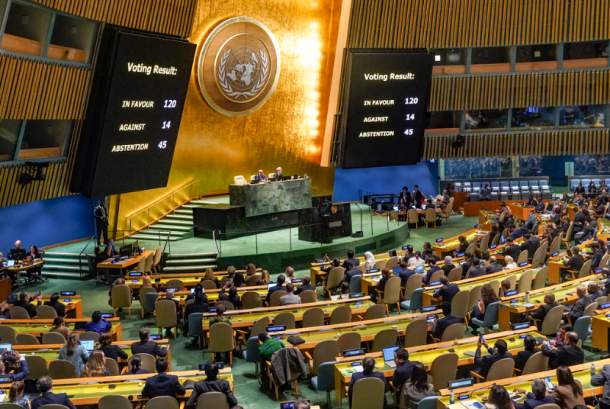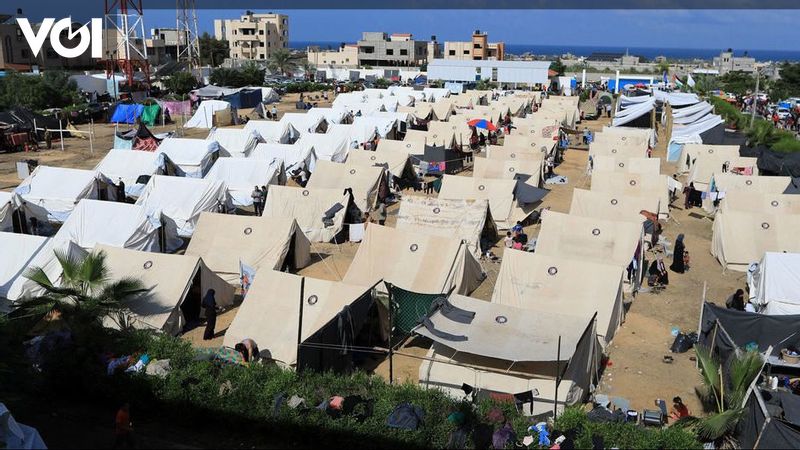NEW YORK — The United Nations General Assembly held early Saturday (10/28/2023) WIB finally adopted a resolution calling for a ceasefire on humanitarian aid to Gaza. With diplomats around the world in agreement, Israel would have carried out its largest airstrike on Gaza, launched a ground offensive and shut down the internet in one fell swoop.
The fight to pass this non-binding resolution was not easy, with 120 state representatives voting for, 14 against and 45 abstaining. The countries refusing are the United States, Israel, Austria, Czech Republic, Guatemala, Papua New Guinea, Fiji, Hungary, Croatia, Paraguay and four small countries in the Pacific region , namely Tonga, Nauru, the Marshall Islands and Micronesia.
Meanwhile, 45 other countries abstained, including Canada, Germany, which supported Israel in the war from the start, then Great Britain, the Netherlands, Estonia, Slovakia, Lithuania , Romania, Japan, South Korea, Monaco, Italy, Ukraine, Australia, Poland, Cyprus, Denmark, Sweden, Finland, Serbia, Greece, Philippines, Haiti and Pacific countries, such as Tuvalu , Vanuatu, Kiribati and Palau.
Meanwhile, the majority of 120 countries have accepted the resolution initiated by Jordan. Although before this resolution, a similar resolution was proposed at the initiative of the United States, which accused Hamas of being responsible. However, the resolution proposed by the United States ended in failure as two-thirds of the votes, or the majority of countries, rejected this resolution.
The UN envoy for Palestine, Riyad Mansour, welcomed the results of the Jordanian resolution which was successfully adopted. Although not binding, this resolution calls for a humanitarian ceasefire in Gaza that could end the war. Because it means “less killing of children, less killing of civilians, less destruction.”
Riyad Mansour said the Palestinian delegation would continue to try to get the UN Security Council to adopt a binding resolution calling for a ceasefire. Although the United States previously vetoed this binding resolution, Russia responded separately, vetoing the US resolution legalizing Israel’s war in Gaza.
“We thank you as journalists who covered our story, because some media outlets are blinded by unfair narratives when covering our story. Please cover it fully, cover comprehensively, cover the massacre and crimes committed against our people in Gaza,” Mansour added.
The resolution initiated by Jordan on behalf of the Arab Group does not directly mention “Hamas” or “hostage-taking”, but it calls for “an immediate, lasting and sustainable ceasefire”.
“The resolution also calls for immediate humanitarian assistance, including the return of water, electricity and transportation equipment – which Israel has not allowed… fuel,” James Bays said of Algeria.
Even though this resolution does not impose legal sanctions, it at least provides space for Gaza residents who are currently in urgent need of basic necessities. However, if Israel continues to violate it, it will find itself confronted with universal international values and norms.
Because the majority of votes, namely 120 countries out of 179 country representatives present at the UN General Assembly session, accepted the resolution initiated by Jordan.
Meanwhile, Israel’s envoy to the UN, Gilad Erdan, seemed annoyed by the resolution’s adoption. He criticized the UN General Assembly resolution, saying it was a dark day for the UN, which adopted the resolution calling for a humanitarian ceasefire in Gaza.
The Israeli ambassador promised that Israel would use “all means” to fight Hamas. “Today is a day that will remain as a day of humiliation. We have all seen that the UN no longer has legitimacy or relevance,” Erdan said.
Attacks are increasing
As a resolution was reached at the UN, Israel cut off internet and communications in the Gaza Strip, leaving the region cut off from all contact with each other and the outside world and creating an information blackout. This was done amid massive attacks and plans to expand Israel’s ground invasion.
Explosions caused by continued airstrikes lit up the sky over Gaza City for hours after dark. Palestinian telecommunications operator Paltel said the attack caused a “complete disruption” of internet, mobile and landline services.
This disconnect meant that the victims of the attack and the details of the ground attack were not immediately known. Despite this, how many satellite phones still work?
Israel’s move signals it is moving closer to a full-scale invasion of Gaza, where it has vowed to crush the ruling Hamas militant group after its bloody offensive in southern Israel three weeks ago .
Already in the dark after the electricity was cut off several weeks ago, Palestinians have been forced into isolation. They are crowded into homes and shelters, where food and water supplies are running out.
The loss of internet and telephone was a further blow to the medical and humanitarian system in Gaza, already on the verge of collapse. The system was overwhelmed by the number of injured and lack of supplies under Israeli watch for weeks.
More than 1.4 million people have fled their homes, nearly half crowded into schools and UN shelters. Aid workers say the small amount of aid Israel authorized from Egypt last week is only a fraction of the amount needed.
The Palestinian death toll in Gaza has exceeded 7,300, more than 60 percent of whom are minors and women, according to the territory’s health ministry. The blockade of Gaza means dwindling supplies, and the UN has warned that aid operations helping hundreds of thousands of people are “collapse” due to near exhaustion of fuel.
More than 1,400 people were killed in Israel during the Hamas attack on October 7, according to the Israeli government, and at least 229 hostages were taken to Gaza. The total death toll far exceeds that of the four previous wars between Israel and Hamas, which was estimated at 4,000.
Defense Minister Yoav Gallant told foreign journalists that Israel expected a long and difficult ground attack on Gaza to be imminent. “It will take a long time” to dismantle Hamas’ vast network of tunnels, he said, adding that he expected a long phase of low-intensity fighting while Israel crushes “pockets of resistance.” “.

“Professional communicator. General music practitioner. Passionate organizer. Evil twitter fan.”






